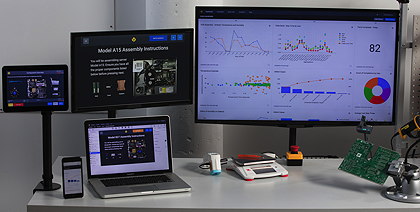- Home » News » Technology News
IoT platform allows manufacturers to create their own apps

A US company has developed an IoT-enabled software platform that allows engineers to create shop-floor apps that connect workers, machines and IT systems.
Massachusetts-based Tulip – a spinout from MIT – unveiled the development at the recent Hannover Fair, following two years of development in “stealth mode”. It claims that its cloud-based Manufacturing App Engine brings the power of Industrial IoT and advanced real-time analytics to front-line engineers and will lead to improvements in productivity and quality, as well as reductions in the need for training.
According to Tulip, its modular platform fills a gap between rigid back-end manufacturing IT systems and the dynamic operations on the shop-floor. Rather than relying on rigid software that cannot be adapted to users’ needs, Tulip’s modular platform gives engineers the tools to create their own unique and flexible apps.
These apps guide shop-floor operations and allow data to be collected in real time. An IoT gateway integrates devices, sensors and machines, making it easy to monitor and interact with data-streams that were previously separate. An analytics engine allows manufacturers to turn this data into actionable insights, and thus to improve their processes.
As part of its development programme, Tulip has installed its technology at “dozens” of user sites in six countries, in industries including consumer electronics, aerospace, automotive, clothing, medical devices and pharmaceuticals.
Some of these sites have reported increases in throughput of up to 20% and reductions in time needed to train new operators of up to 90%.

One pilot user was Jabil Circuit, a contract manufacturer of electronic assemblies. Previously, it relied on paper-based instructions and audit procedures to guide its operators and to identify inefficiencies. Using Tulip’s platform, Jabil created smartphone and tablet apps to guide its operators through the complex assembly processes. Digital forms allow them to track and report on quality issues in real time.
Data gathered from Jabil’s shop-floor is now analysed continuously and can be visualised via customised dashboards. The operators can respond on-the-fly to any process changes. According to Tulip, the ability to guide, track and analyse operator and machine data in real time has simplified root cause analysis and improved processes, despite Jabil’s relatively small production runs. Within four weeks, Tulip reports, yields increased by more than 10%, while quality issues related to manual assembly dropped by 60%.
Tulip has recently attracted $13m in funding to help expand its research, design and customer support activities.





